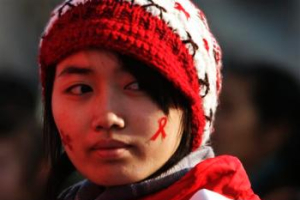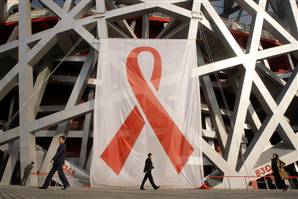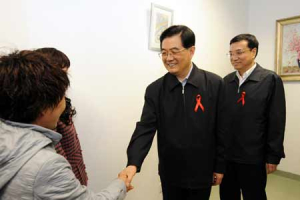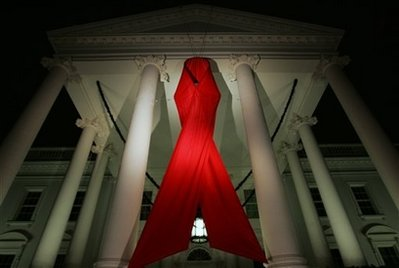Chinese Ministry of Health and U.N. AIDS agency issued a statement on Sunday, pledging to commit to the fight against stigma and discrimination towards the people with the disease, and they hung a massive red ribbon, the symbol of AIDS awareness, at the Olympic Bird’s Nest stadium in Beijing, according to Associated Press.
“Stigma and discrimination are major obstacles in an effective response to AIDS,” said Health Minister Chen Zhu at the event’s launch in front of Bird’s Nest stadium, NBC news reports. “We need to engage all sectors of society in China to combat these issues and work together to stop the disease.”
Furthermore, the ministry issued a statement that said the government will strengthen efforts in education on AIDS prevention and to fight discrimination, while increasing the distribution of condom and outreach to high-risk groups such as prostitutes and homosexual men.
According to the latest nationwide survey conducted by UNAIDS, more than 48 percent of Chinese thought they could contract HIV from a mosquito bite, while 18 percent thought they could get infected if an HIV-positive person sneezed or coughed on them.
Two- thirds of respondents to the UNAIDS survey said they would not want to live with an HIV-positive person, while nearly 48 percent would be unwilling to have meals with the infected person. In a further hint of stigma, about 41 percent said they would be unwilling to work or share tools with the person who was HIV-positive, and 12 percent would not even touch a family member or relative with the infection.
In the 1990s, drug use accounted for 60-70 percent of reported infections in China, followed by unsanitary blood transfusions.
But in September of this year, the Chinese Ministry of Health announced that sexual transmission had overtaken intravenous drug use as the main cause of HIV infections in China.
In Beijing, in particular, sexual transmissions have accounted for 55 percent of cases so far this year. And from 2004 to 2007, the percentage of sex-related transmissions has risen steadily, from 24.9 percent in 2004 to 41.5 percent in 2007, according to a recent city survey.
The official estimate number of people carrying HIV in China is around 700,000 and around 85,000 people with full-blown AIDS, UNAIDS said in a statement. But the number of officially reported HIV cases remains only 264,302 — far lower than the estimated total, in part because of reluctance to seek testing.
According to Ministry of Health’s report, 264,302 people have contracts the disease by the end of September. A total of 34,864 people died of AIDS so far, the ministry said.
Revealing the government’s resolve to tackle the growing AIDS problem in China, Xinhua news reported, on Nov. 30, Chinese premier Wen Jiabao’s visited to people living with HIV/AIDS in eastern Anhui Province, and he told a special symposium composed of AIDS experts and grassroots medical workers in Funan County that the government funds for prevention and control would increase year-by-year.
Furthermore, Chinese President Hu Jintao, who wore a crimson ribbon, visited Ditan Hospital’s Red Ribbon Center that provides HIV-infected persons with services such as psychological counseling, health education and assistance in AIDS-related legal affairs. During the visit, Hu shook hands with two female HIV/AIDS patients and questioned them about their lives. This event was widely reported in Chinese medias to help remove stigma against HIV/AIDS patients.
Hu said that all levels of governments should “provide each citizen with AIDS control and prevention knowledge and offer assistance to each patient in real actions.”
"We have made obvious improvements in the AIDS control and prevention campaign, but the situation remains arduous and we should spare no efforts in the work,” said Chinese president.
According to the Chinese media, the China has adopted a policy of "four frees, one care” in 2003, which stands for free HIV testing, free counseling and treatment for carriers in rural regions; free medication for all pregnant HIV carriers, and free education for AIDS orphans and care for impoverished AIDS patients and elimination of AIDS-related discrimination.
Within the first nine months of 2008, over 420,000 people took the test and around 4,600 people were tested as HIV positive, Xinhua reports. As of September, China had established nearly 6,000 medical stations that provide free consultations and tests for people who might be infected. Furthermore, by the end of September, medical institutions had treated more than 54,000 AIDS patients, the country's traditional medical treatment for AIDS had been adopted in 15 provinces and more than 90 percent of the AIDS orphans had been helped to continue their studies.
Furthermore, Beijing city authorities have decided to offer free spit tests for AIDS/HIV to the local citizens. Spit tests have been used as a substitute for blood test for the purpose of determining the disease, according to Times of India.
The move came after China’s ministry of Health expressed worry over rising incidence of AIDS among migrant workers, who leave their homes in distant villages to work in factories in urban areas. Migrant workers, who have shown a marked tendency towards prostitution, are known to be least likely to get themselves tested for AIDS either for want of time or money.
The free spit test, which yields results in two hours, is expected to uncover many hidden cases of AIDS, the Times reported.
Spit test is useful in the case of people who are obese or impaired access the veins. It is useful in medical centers that do not have good blood drawing facilities. This kind of test helps minimize the risk of accidental infection in blood drawing.
Xiao Dong, director of the Beijing Association of STD & AIDS Prevention and Control, said three Beijing hospitals will provide free tests using kits provided by Chaoyang Chinese AIDS Volunteer Group, a non-governmental organization.
"The Chaoyang Chinese AIDS Volunteer Group also did comparison tests on 300 college students randomly recruited and 300 patients already proven to be HIV positive. We found the accuracy was around 97%," the Chinese media quoted Xiao as saying.























